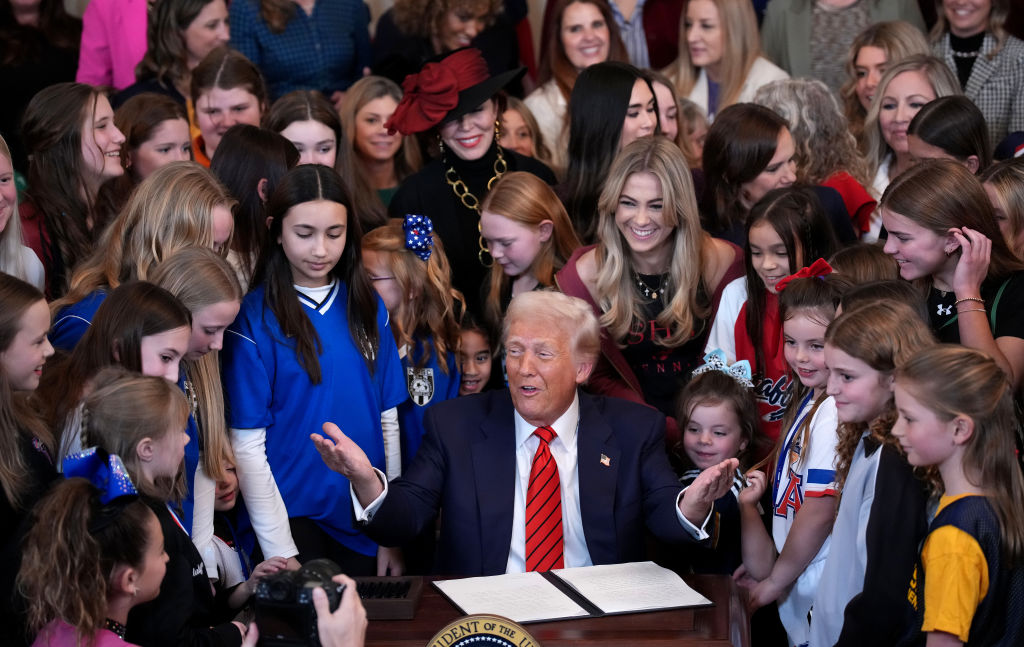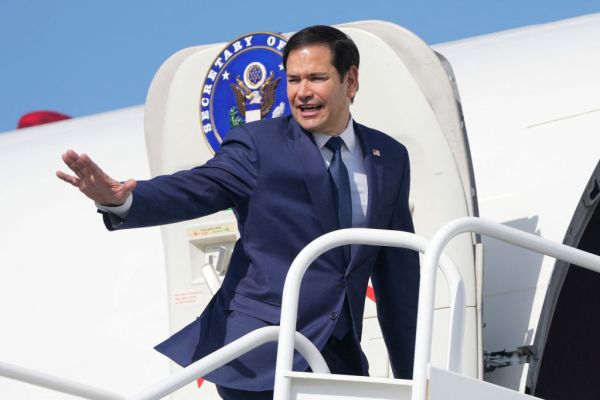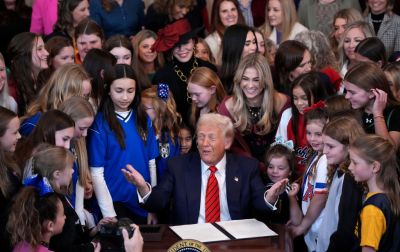Politically, Donald Trump has never had it this good.
The new president has had an energetic start to his second term, which stands in stark contrast to the final, lethargic months of his predecessor’s tenure. He’s getting his Cabinet appointments confirmed, pardoning his most loyal (and violent) supporters, and delivering cultural wins to his base at a remarkable clip. And along the way he’s driving much of professional bureaucratic Washington absolutely crazy.
Best of all for Trump, Americans say they love what he’s done with the place so far.
The new president has his highest job approval ever across both of his nonconsecutive terms and is even above water for the first time, according to the Real Clear Politics average of polls since his January 20 inauguration. The latest CBS News poll, taken over three days in the middle of last week, demonstrates just how well Trump is doing across the board, with 53 percent of adults saying they approve of his performance so far. Half or more of all age groups say they approve, including an incredible 55 percent of voters under the age of 30. Large majorities in the poll say they describe Trump as “effective,” “focused,” “competent,” “tough,” and “energetic.” Only a small group of die-hards, 37 percent, say Trump is “compassionate,” but a powerful president has to break a few (very expensive) eggs to Make America Great Again, right?
The policies and proposals Trump has promised are to come also have a strong base of support as his administration pursues them. Majorities in the CBS poll support sending U.S. troops to the southern border with Mexico and using the federal government to find and deport people in the country illegally. They also support imposing tariffs on China and Trump’s handling of the Israeli-Hamas conflict.
Still, the very positive CBS News poll does include some indications of where Trump’s string of good fortune could hit a snag. One wrong move or unfulfilled expectation could start him down a more difficult political path, and we could look back at this as just another presidential honeymoon period that gets mugged by the reality of modern governance.
Take Joe Biden, who in April 2021 had an approval rating of 58 percent in the CBS News poll. It was released roughly a week after Biden had announced the final withdrawal of American troops from Afghanistan, a process that ended in disaster months later and led to the first serious hit to the then-president’s approval rating. Biden never recovered as other issues, from a struggling economy, increasing inflation, and an immigration crisis at the border consumed his presidency.
Could a similar event or series of events plague a Trump administration that has begun with such a positive response from the American public?
The most obvious potential snag is the economy, with the poll’s respondents giving a mixed assessment about whether Trump’s policies will make their own financial situation better or worse—and even a narrow majority, 51 percent, who say they expect his policies to make the price of their groceries increase.
And consider increasing tariffs, which economists of all political stripes generally abhor but that can often be politically popular in the abstract. Trade protectionism is one of Trump’s signature issues, but the reviews for his non-China tariff proposals have been mixed. Majorities oppose new tariffs on Mexico (56 percent), Europe (60 percent), and Canada (62 percent), while a whopping 73 percent say they believe new tariffs will raise the price on imported goods.
So Americans approve of Trump’s job performance even as they expect his policies will make products more expensive. For those committed to the idea that Trumpian interventions in our trade policy will inevitably and eventually lower prices and improve the economy, these poll numbers represent an opportunity to win over skeptical-but-optimistic voters and overperform expectations. But as the Biden administration learned the hard way, the tolerance for higher prices and inflation has severe limits. The White House will need to be careful about testing those limits, even if, in the words of Elon Musk, the “temporary hardship” is supposed to “ensure long-term prosperity.”
Speaking of Musk, there is less certainty among Americans about Trump’s billionaire buddy than for the actual president himself. Yes, a narrow majority (51 percent) say they believe Musk and his Department of Government Efficiency task force should have “a lot” or “some” authority over the operations of the executive branch, but nearly just as many (46 percent) say he should have only “some” or “not much” authority. That suggests that while Americans may have some embedded confidence in Trump himself, they are still getting to know Musk and understand exactly what he and the DOGE team are up to.
The targets of Musk’s approach have mostly been government bureaucrats, who engender little sympathy from the rest of America. But we are beginning to see a political response to his initial wanton slashing through the executive branch. Take the recently announced cuts to the National Institutes of Health’s university research grants that a DOGE spokeswoman, Katie Miller, praised as “doing away with Liberal DEI Deans’ slush fund.”
That sounds like a worthy cause for all MAGA Republicans in good standing, a group that would include Sen. Katie Britt of Alabama, a committed ally of the president from one of the most pro-Trump states in the country. Yet within a day of the announcement, Britt was telling local news outlets that she would be working to keep research at her state’s institutions like the University of Alabama at Birmingham and the University of Alabama at Huntsville going.
“Every cent of hard-earned taxpayer money should be spent efficiently, judiciously, and accountably — without exception,” Britt told AL.com. “While the administration works to achieve this goal at NIH, a smart, targeted approach is needed in order to not hinder life-saving, groundbreaking research at high-achieving institutions like those in Alabama.”
It may be easy for Trump to extend carve-outs and exemptions for his political allies to any number of cuts. But while the Musk-led descent on the bureaucracy may be a long-planned goal—retribution against the anti-Trump Deep State that kept his first term from being the glorious success it should have been—its execution risks creating a bevy of predictable and unpredictable consequences. How many negative stories of abandoned clinical trials or cuts to Christian-run aid programs could begin to gnaw the media-attentive Trump? What if food costs continue to rise during a protracted trade dispute? Does the big, beautiful slashing of programs and agencies in the executive branch begin to look different to Americans if the narrow Republican majorities in Congress are unable to find keep the government funded? Or what about the moment a major natural disaster or international incident forces Trump’s disruption-happy Washington to sober up and address a real crisis? Even Trump, who was born in the chaos, molded by it, could be overwhelmed.
But if and until then, the honeymoon continues.







Please note that we at The Dispatch hold ourselves, our work, and our commenters to a higher standard than other places on the internet. We welcome comments that foster genuine debate or discussion—including comments critical of us or our work—but responses that include ad hominem attacks on fellow Dispatch members or are intended to stoke fear and anger may be moderated.
With your membership, you only have the ability to comment on The Morning Dispatch articles. Consider upgrading to join the conversation everywhere.